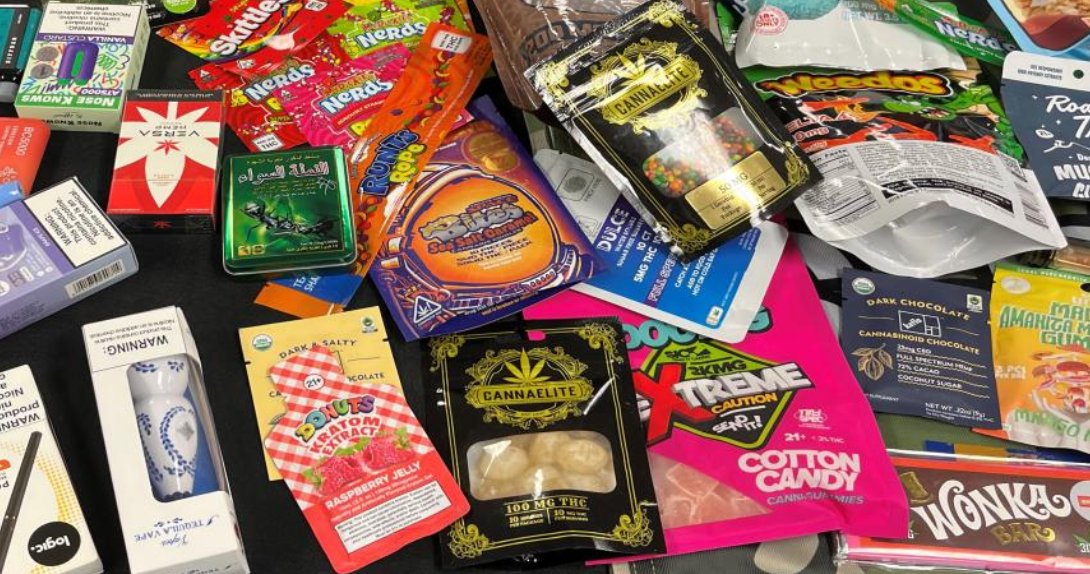Hundreds of unregulated smoke shops that sell hemp products in the Philadelphia suburbs use fraudulent lab reports that leave their customers “dangerously uninformed” about the potency of the drugs they’re taking, according to a Montgomery County grand jury report released Thursday.
The 10-month investigation led by the district attorneys of Montgomery, Bucks and Chester counties examined a patchwork of businesses launched in recent years to take advantage of federal laws that allow hemp products to be sold legally with low levels of THC, the psychoactive ingredient in cannabis.
MORE: Intercity bus terminal on Filbert Street to be renovated and reopened in 2026
Montgomery County District Attorney Kevin Steele said an “unintended consequence” of the 2018 Farm Bill is that unregulated smoke shops now sell a wide range of products that they claim meet legal standards but are actually much stronger than advertised.
“What we found in a lot of them is they’re selling straight-up marijuana,” Steele said at a news conference Thursday.
Narcotics detectives from all three counties went undercover to purchase products from smoke shops and have them lab-tested for potency. More than 90% of the edibles, THC vapes and loose flower products that were analyzed exceeded federal standards, the grand jury found, and many were mislabeled or backed by dubious certificates from suppliers.
“This deception means that adults and children alike are exposed to substances whose potency and risks are hidden from view,” the report says.
Steele said the most troubling facet of the smoke shop industry is that the products are often marketed toward children and can be sold to anyone who walks through the door. Some shops also carry other intoxicating products, including kratom and tianeptine, that have been associated with hospitalizations and substance abuse issues.
The grand jury report details nine times in the past year children were sickened after ingesting THC products commonly sold at smoke shops.
“They’re selling illegal products without oversight, and without concern for the health of Pennsylvanians, especially without regard for the health of our children,” Steele said.
The 107-page report calls on state lawmakers to impose standards for product safety and testing at accredited labs, establish an age limit of 21 for THC products, and regulate the marketing of THC products with the same rigor applied to tobacco and nicotine. The report also urges lawmakers to create clear definitions of marijuana derivatives — such as Delta-8, Delta-10 and THCA — to prevent them from being sold under the banner of “legal hemp.”
Steele said Montgomery County’s 240 smoke shops now outnumber schools and have turned fuzzy federal hemp laws into big business.
“People are hiding behind that, saying this is Farm Bill compliant,” he said.
Steele was joined Thursday by Bucks County District Attorney Jennifer Schorn and Chester County District Attorney Chris de Barrena-Sarobe, who said the deceptive practices of smoke shops are “flagrant” and “unsustainable.”
In Chester County, De Barrena-Sarobe said he’s already issued 16 search warrants at smoke shops, arrested some lawbreakers and seized more than half a million dollars in cash and other proceeds. Steele said his office has taken similar actions when illegal activities are found.
“People that are selling drugs out of their stores — selling marijuana, that’s a felony,” Steele said. “If you continue on in this way, plan on getting arrested.”
The grand jury report comes against the backdrop of Pennsylvania’s halting efforts to legalize recreational marijuana, a move that would create clear standards and a licensing process for sales of the drug, amid a monthslong budget standoff in Harrisburg. Some lawmakers hope to first establish a cannabis control board to lay the groundwork that would address the sale of marijuana derivatives.
Steele said the problems found at smoke shops are separate from the state’s licensed medical marijuana dispensaries, noting that their business has been impacted by unregulated stores that circumvent taxes and other restrictions on cannabis.
Last week, Pennsylvania Attorney General Dave Sunday joined colleagues across the country in a joint letter calling on Congress to close the loophole that has allowed “intoxicating hemp-derived THC products” to flourish at businesses that “pursue profits at the expense of public safety and health.”
Steele said smoke shops in the region are getting away with selling products that don’t even hide their appeal to kids and teens. He displayed a photo from the grand jury report showing packages of edible THC products found at shops in the area.
“You’ve got Cheetos with marijuana leaves on it,” he said.
